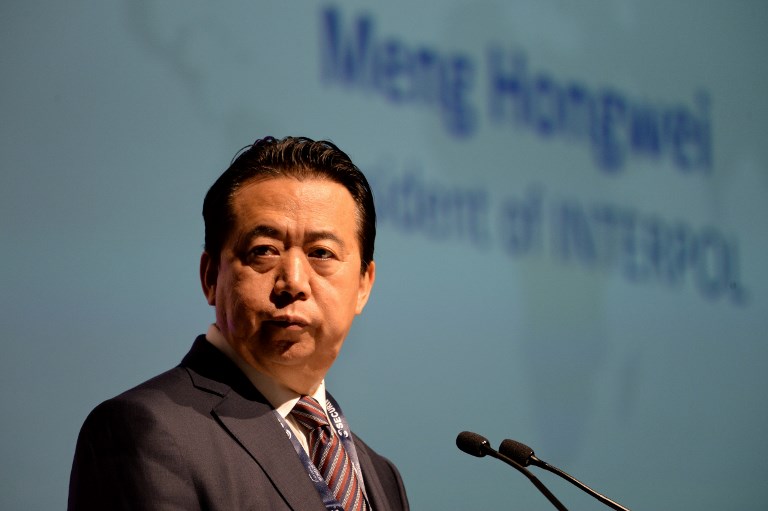
An investigation into Meng Hongwei’s disappearance was launched on October 5, 2018 according to a source close to the case. Meng Hongwei had not been heard since travelling to China at the end of September. / AFP PHOTO
by Ben Dooley, with Daniel Abelous and Pierre Pratabuy in Lyon
Agence France Presse
BEIJING, China (AFP) — Beijing announced Monday the Chinese head of Interpol, who vanished after returning to his homeland, was under investigation for possible criminal activity, and the world police organization said he had resigned.
The revelations came as Meng Hongwei’s wife voiced concern for his life after receiving a final text message from his phone with a knife emoji.
Beijing had remained tight-lipped about the fate of Meng, who is also China’s vice minister for public security, since his disappearance was disclosed by French officials on Friday.
The National Supervisory Commission, which handles corruption cases involving public servants, broke the official silence early Monday, saying in a one-line statement that Meng “is currently under investigation on suspicion of violating the law”.
Soon after, Interpol said it had received Meng’s resignation “with immediate effect”.
It is the latest high-profile disappearance in China, where a number of top government officials, billionaire business magnates and even an A-list celebrity have vanished for weeks or months at a time.
When — or if — they reappear, it is often in court.
Meng, the first Chinese president of Interpol, was last heard from on September 25 as he left Lyon — where the world police body is based — for China.
The agency’s secretary general Juergen Stock, who oversees day-to-day operations, had said Saturday that it was seeking “clarification” on his whereabouts from Chinese authorities.
French police had opened an investigation into Meng’s disappearance last week, according to a source close to the inquiry.
Meng, 64, had lived with his wife and two children in France since being elected Interpol president in 2016 for four years.
The agency said it will elect a new president next month at its general assembly in Dubai for the remaining two years of Meng’s term.
Danger emoji
Speaking to reporters in France on Sunday, Meng’s wife Grace said she had received a message from his phone containing a knife emoji before his disappearance.
That day, she said he sent a message telling her to “wait for my call”, before sending the emoji signifying danger.
“This matter belongs to the international community,” she told a press conference.
“I’m not sure what has happened to him,” she said.
Later, upon learning about the announcement from China’s anti-graft commission, she told AFP that her husband’s case will be under the watch of “international law and international public opinion”, describing the situation as “political ruin”.
China’s recently established National Supervisory Commission holds sweeping powers to investigate the country’s public servants with few requirements for transparency.
Although the commission did not detail the allegations against Meng, its mandate is to investigate corruption cases as part of Chinese President Xi Jinping’s anti-graft campaign.
Some critics of the effort — which has punished more than one million officials — say it also functions as a tool for Xi to eliminate his political rivals.
Red notices
Meng rose up the ranks of the country’s domestic security apparatus when it was under the leadership of Zhou Yongkang, a rival to Xi and the highest-ranking official to be brought down on corruption charges.
Zhou — who was sentenced to life in prison in 2014 — was subsequently accused of conspiring to seize state power and authorities have continued working to root out his influence.
He appointed Meng vice security minister in 2004.
In that role, Meng has been entrusted with a number of sensitive portfolios, including the country’s counter-terrorism division, and he was in charge of the response to several major incidents in China’s fractious western region of Xinjiang.
Critics of Meng’s 2016 election to Interpol’s presidency said he would use the position to help China target dissidents abroad under the guise of pursuing corrupt officials.
Interpol has downplayed the concerns, saying the president has little influence over the organization’s day-to-day operations, which are handled by secretary general Stock, a German.
The Chinese effort to track down corrupt officials abroad, known as Operation Fox Hunt, has led to claims in some countries that Chinese law-enforcement agents have been operating covertly on their soil without the approval or consent of local authorities.
China currently has 44 outstanding red notices, mostly related to murder, intentional injury and drug smuggling, according to Interpol’s website.
During Meng’s tenure, Interpol issued a red notice for fugitive Chinese billionaire Guo Wengui, who threatened to reveal corruption at the country’s highest levels.
Authorities in China and Hong Kong have accused Guo, a real estate tycoon who resides in the United States, of laundering billions of dollars among other crimes.
© Agence France-Presse







